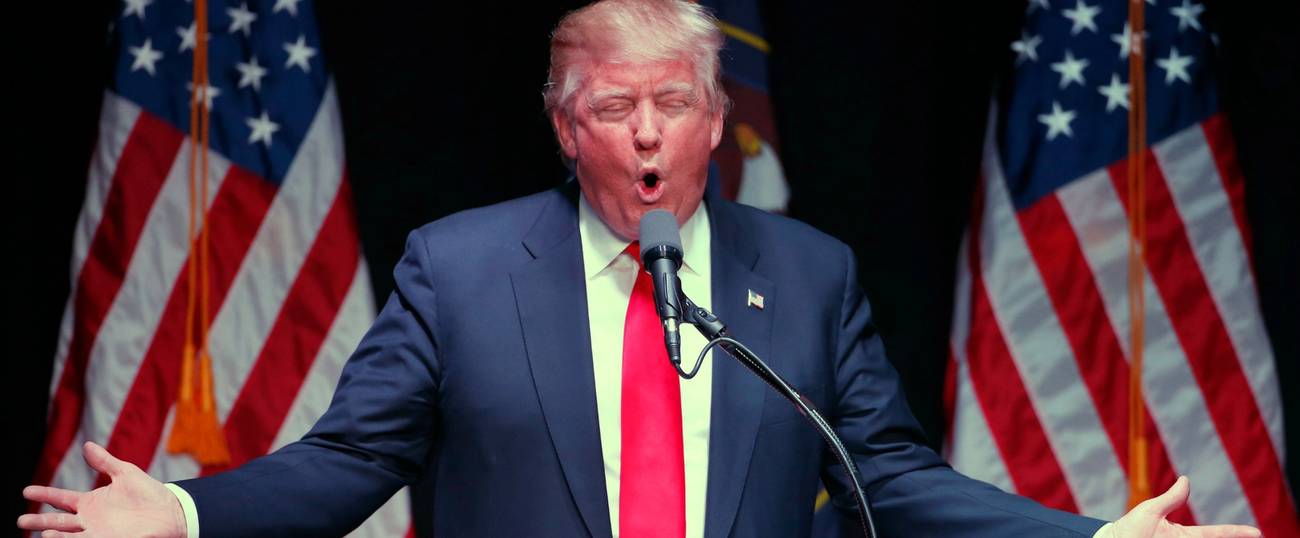On Torture, Trump Is Consistent
‘I’d bring back a hell of a lot worse than waterboarding’





Donald Trump has muddled his position on just about every conceivable issue over the course of a uniquely incoherent presidential campaign—good luck figuring out whether or not the New York real estate developer supports high-skilled immigration, or actually intends to build a big, beautiful 80-foot wall on the U.S.-Mexican border, or has any discernable policy on the Israeli-Palestinian peace process. His views are both fluid and empty. As a candidate, and as a policy thinker, Trump often recalls Wallace Stevens’s The Snow Man, obsolescing in the January sun, beholding nothing that is not there, and nothing that is.
But he’s remained unerringly consistent on one issue: Torture! Has Trump ever had a negative word to say about the instrumental infliction of intolerable pain on America’s known or suspected enemies? Trump endorsed waterboarding all the way back in November of 2015, saying that terrorists deserved to be waterboarded even if it could be proven the method had no interrogation value.
But why stop there? “I’d bring back a hell of a lot worse than waterboarding,” Trump promised on February 7 before declaring that “torture works” some ten days later. Trump has bemoaned the asymmetry of ISIS having the ability to behead people at its leisure while the U.S. prohibits the use of enhanced interrogation methods. On March 22, Trump claimed that torture would have prevented the recent terrorist attacks in Brussels, and he came out in favor of torturing Salah Abdulsalam, a terrorist linked to the November 2015 Paris attacks who was arrested on in Brussels on March 21.
“He may be talking but he’ll talk faster with the torture,” Trump said, according to Real Clear Politics. “Hard to believe we can’t waterboard which is—look, nothing’s nice about it but it’s minimal form of torture. We can’t waterboard and they can chop off heads.”
Trump’s support for torture has been too consistent to write off as an election ploy. His enthusiasm for the practice doesn’t appear to be aimed at protecting the complicated torture-related legacy of George W. Bush, especially since Trump has accused the former president of intentionally lying to build the case for the U.S.-led invasion of Iraq. Trump seems convinced that torture actually is an effective means of preventing terrorist attacks—a claim that’s contradicted throughout the U.S. Senate’s 2014 report on the CIA’s interrogation program.
Jewish law technically allows torture in order to protect human life from imminent danger, as Shlomo M. Brody wrote in a 2014 Tablet piece. But as Brody notes, a number of Jewish thinkers, including former George W. Bush administration lawyer Dov Zakheim, have argued that because torture isn’t effective, and because it’s only permissible if it can be proven to be effective, the practice isn’t in fact justifiable under Jewish law.
This tension within Jewish thought on the use of torture reflects the fraught nature of the entire subject, and the unanswerable hypothetical questions lying at its heart. In what situations is it worth inflicting harm to prevent harm—assuming there’s even a causal connection between these two things? And what moral imperatives allow or even demand the commission of potentially evil acts?
There’s no evidence that Trump has ever really engaged with these dilemmas. His views on the topic make characteristically little allowance for nuance. In Trump’s world, an interrogation is a kind of deal-making, a more or less violent search for a middle ground between a suspect and his captors. And you don’t voluntarily give up your best leverage before you even sit down at the negotiating table.
Trump’s views on torture are an extension of an unfailingly transactional worldview. For Trump, pain appears to be just another form of currency.
Related: Trump Watch [Tablet series]
Armin Rosen is a staff writer for Tablet Magazine.